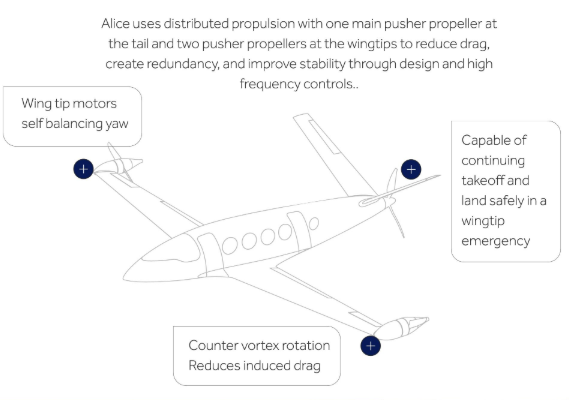Meet Alice, the battery-powered plane that could herald the age of electric air travel

The future of flight? Image: Eviation

Get involved with our crowdsourced digital platform to deliver impact at scale
Stay up to date:
Aerospace and Aviation
Every minute, 84 flights take off worldwide. Last year, more than 4 billion journeys were made by plane.
Air travel underpins trade, tourism and economic growth, but it is also a contributor to climate change.
So what about catching an electric plane? Let us introduce you to Alice – a prototype unveiled at this year’s Paris Air Show. Planes like this could be the future of short-haul flights.

Developed by Israeli firm Eviation, the plane will be able to carry nine passengers for up to 1,046 km.
The aircraft has one main pusher-propeller on the tail and one on each wing. Eviation says the shift to electric could significantly reduce operating costs, while eliminating greenhouse gas emissions.
What’s the World Economic Forum doing about climate change?
Climate pledge
It’s calculated the aviation industry contributes around 2% of global emissions. The sector says it is trying to combat its impact on the environment through new technology, improved efficiency and sustainable fuels.
The IATA has pledged to reduce air travel’s CO2 emissions to half its 2005 levels by 2050.

Eviation wants to make electric aviation a feasible proposition, but the technology does currently have limitations. While the flight range of aircraft such as Alice would make them viable for use on short-haul routes, that’s not the case for long-haul.
Around 80% of aviation’s CO2 emissions come from flights of over 1,500km (932 miles), according to the Air Transport Action Group.

The challenges of electric flight are also on the agenda of mainstream manufacturers. Boeing launched a prototype earlier this year, and last year Airbus, Siemens and Rolls-Royce unveiled a project to develop a hybrid-electric propulsion system.
Meanwhile, US regional airline Cape Air has already expressed an interest in the all-electric Alice, saying it will order a “double-digit” number of the aircraft to operate on some of its short routes. The aircraft is expected to take to the skies in 2022.
Don't miss any update on this topic
Create a free account and access your personalized content collection with our latest publications and analyses.
License and Republishing
World Economic Forum articles may be republished in accordance with the Creative Commons Attribution-NonCommercial-NoDerivatives 4.0 International Public License, and in accordance with our Terms of Use.
The views expressed in this article are those of the author alone and not the World Economic Forum.
The Agenda Weekly
A weekly update of the most important issues driving the global agenda
You can unsubscribe at any time using the link in our emails. For more details, review our privacy policy.
More on Fourth Industrial RevolutionSee all
Pooja Chhabria and Michelle Meineke
April 28, 2024
Jeremy Jurgens, Basma AlBuhairan and Arunima Sarkar
April 28, 2024
Thomas Beckley and Ross Genovese
April 25, 2024
Agustina Callegari and Daniel Dobrygowski
April 24, 2024
Christian Klein
April 24, 2024







